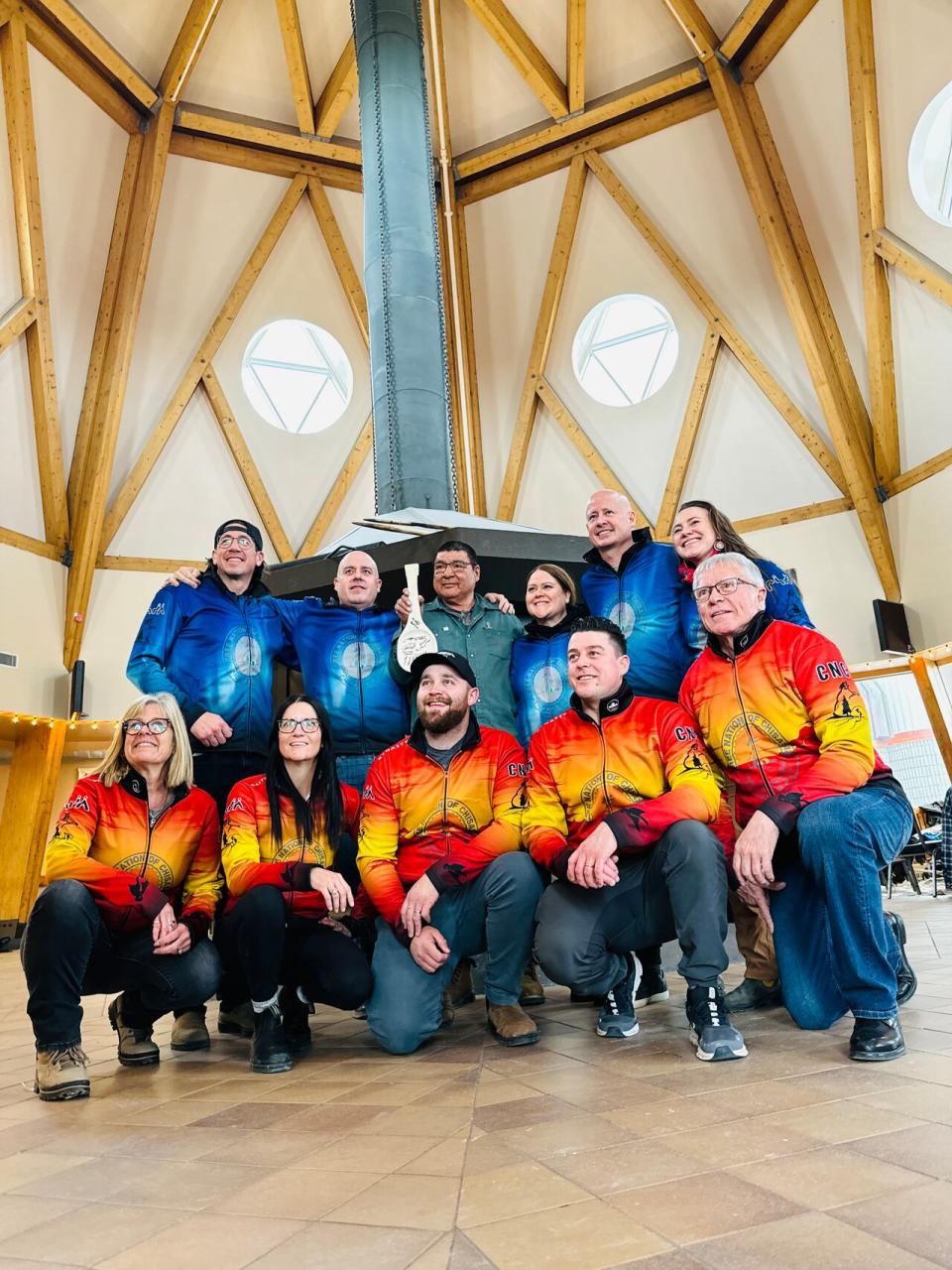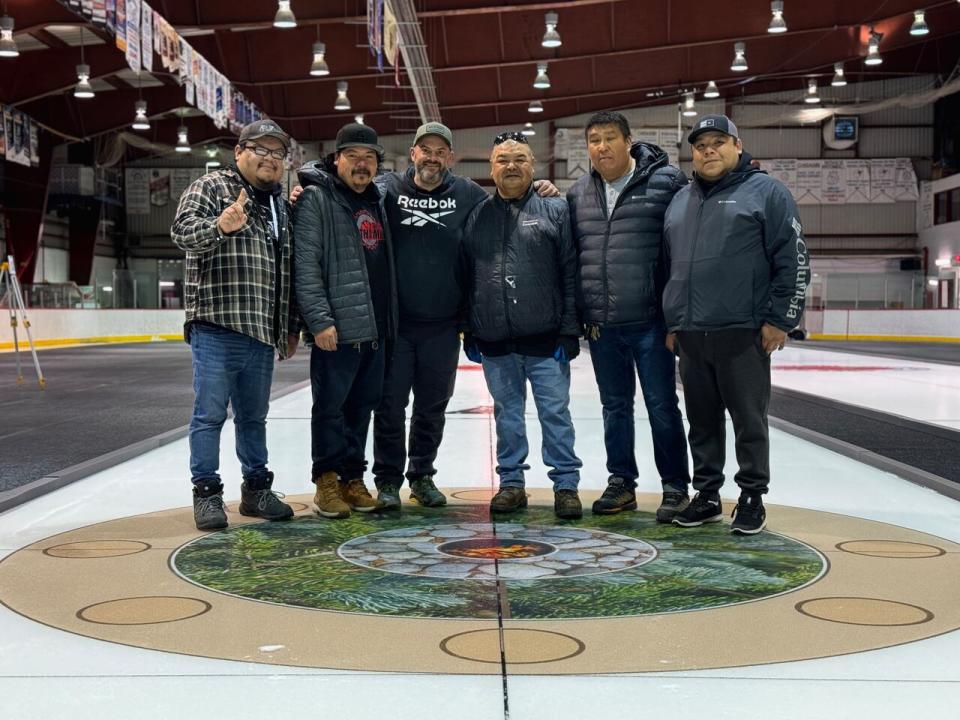Historic Indigenous curling game in Cree Nation of Chisasibi aims to inspire community

Never before has there been a curling game involving Canada's elite Indigenous curlers – until now.
The Cree Nation of Chisasibi, a northern Quebec town on the eastern shore of James Bay, is making history this weekend by hosting ten elite Indigenous curlers from all across Canada who will be taking to the ice for the historic game.
Olympian Kevin Koe, his brother and sister Jamie Koe and Kerry Galusha, four-time Scotties champion Kerri Einarson, curling legend Al Hackner, Olympic silver medallist Carolyn McRorie, Patty and Joe Wallingham, Colin Hodgson and Mike McCarville – all of Indigenous heritage – have travelled to the community that's located nearly 1,000 kilometres north of Montreal.
Between the 10 curlers, there have been 82 Brier and Scotties appearances.
The one-game showdown on Saturday has been in the works for months, all with hopes of inspiring community members to get involved in the game and to also highlight the resilience and strength of a community that was home to two residential schools.
"We want more Indigenous youth to get into sports, whether it's curling or any other sport. But with curling, you can do it anywhere and in any community. Some northern communities have natural ice still," Galusha said.
"It's about being healthy and getting youth into curling. And dreaming big because a lot of us are from northern communities and it's hard to excel in a sport when you live in an isolated place. But you do it if you love the sport and you dream big. Go for it."
The Koe's father, Fred Koe, is a residential school survivor. He told CBC Sports ahead of the 2018 Olympics that curling was going to be something that brought his family together. His three children have been yearly fixtures at the national championships.
A first for Koe curling family
Remarkably though, for all of the curling they've done, never before has Kevin, Jamie and Kerry – one of Canada's most well-known curling families from Yellowknife, N.T. – ever curled on the same team before.
"I've played with Jamie in a couple of events before but never with Kerry. It will be a cool experience and good for our family. We probably won't get that chance ever again. It'll be a one-time chance as crazy as that sounds," Kevin said.
"But to do it at this event will be pretty special."
For as much fun is going to be had on the ice, the smack talking has already begun.
"Well obviously we're going to win," Einarson said.
"I'm super excited to curl with Al [Hackner] and everyone else. I've always loved watching them all curl and growing up watching them. Against the Koes. Wow. Stacked team. I'm so excited and we're going to have so much fun out there."
For months a group of local organizers, led by Rhonda Spencer and Roy Neacappo, alongside Brier participants Hodgson and Darren Moulding have been planning the event, including mapping out how to turn the Job's Memorial Arena, used for hockey, into a curling rink.

2021 Brier champion Darren Moulding, centre-left, has been teaching local community members how to make curling ice this week in Chisasibi. (Devin Heroux/CBC Sports)
Rocks and equipment have been purchased for the community and residents have been working around the clock to pull off the event. Hodgson has played a key role in bringing all parties together to create this curling game.
The curling houses were created by local residents, reflecting important traditions including the medicine wheel and teepee.
After retiring from the game last season, having made six Brier appearances throughout his career, Hodgson wanted to give back the sport and celebrate his Metis identity.
Instrument for reconciliation
He believes events like this curling game in an Indigenous community can transcend sport and act as an instrument for reconciliation.
"I don't think we can as individuals change the world on our own but we can collectively affect our relationship to others and that will transform other relationships as well," Hodgson said.
"By living in the present rather than ruminating in the past or worrying about the future, I've started to have a happy life and affect the bubble around me."
This is not only just about a curling game.
In the days leading up to the game the curlers have visited the local school, sharing their stories with students. They've been on local radio sharing their own stories. There have been dryland curling lessons, ice-making sessions and once the event is over the ice will remain in for students and community members to play on in the weeks to come.
"Maybe one day we'll have an Indigenous curler from our community become a curling Olympian," Neacappo said.
"I'm so proud to be from here. This is where my heart is. I remember watching the Hackner double on TV in 1985. And now I've got to meet him and he's curling in my community."
Team Sunset will be represented by Einarson, Hodgson, Joe Wallingham, Hackner and McRorie. Team Northern Lights will consist of the Koe siblings, McCarville and Patty Wallingham.
The game is set for Saturday afternoon.
WATCH | That Curling Show discusses Brad Jacobs' team change:

 Yahoo Sports
Yahoo Sports 
